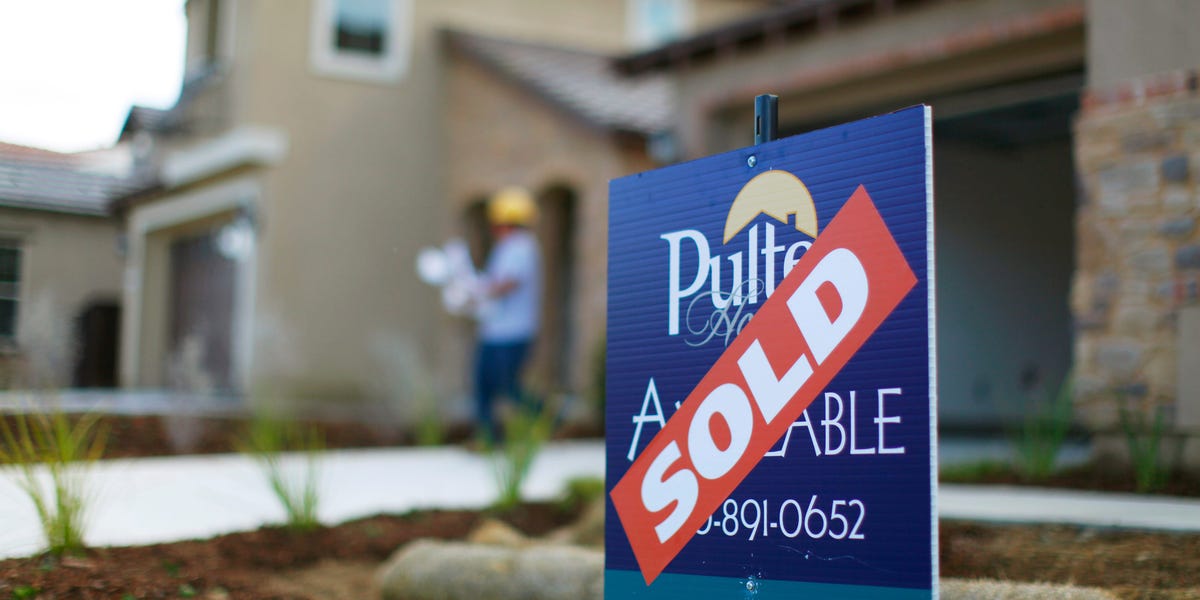- US home prices have soared 47% so far this decade.
- The price surge has outpaced the gains seen in the 1990s and 2010s, and is nearly ahead of the 2000s.
- The rising value of homes has coincided with a millennial-fueled demand surge and years of low mortgage rates.
US home prices have soared 47.1% so far this decade, according to a ResiClub analysis of the Case-Shiller National Home Price Index.
The massive price gains seen in the first four years of the 2020s have eclipsed all of the growth seen in the 1990s and 2010s, according to the analysis. Housing prices in those two decades grew 30.1% and 44.7%, respectively.
On top of that, housing price growth in the 2020s is on the verge of eclipsing all of the growth seen in the 2000s, which was 47.3% after peaking at just over 80% before the 2007 housing market crash.



Almost four years.
Anyone that thinks this isn’t a bubble is a moron.
It’s not a bubble, it’s much much worse. You only hear of it in whispers among the financial world. It’s stagflation. Japan seen this story before, they call it their lost decade that has been going on for nearly half a century. It’s when you deficit spend like crazy to prop up the economy and that leads to high inflation and stubbornly high costs (IE: Housing). It’s coupled with basically no wage growth and high underemployment. Does any of this sound familiar? It buried Japan, it might bury USA.
This spike in Inflation isn’t that high in the grand scheme of things and we have both historically low unemployment and higher than average labor force participation.
The current situation doesn’t resemble stagflation.
Actually it exactly resembles stagflation. It’s one of the reasons I said underemployment and not unemployment. During the 90s, Japan’s inflation rate was around 3% and they couldn’t get it under 2%. Sound familiar?
https://www.in2013dollars.com/japan/inflation/1990#:~:text=The yen had an average inflation rate of,82.953%25 of what it could buy back then.
The other part was low unemployment, but mostly government jobs that didn’t do anything. But it did create historically low unemployment and higher than average labor force participation.
https://mpra.ub.uni-muenchen.de/14332/#:~:text=The ‘lost decade’ in Japan was a period,when it reached a historical maximum of 5.5%25.
What you are seeing is USA doing exactly what Japan did in the 90s, which is have a target inflation rate of 2% that they can’t reach and hiding the high unemployment numbers with underemployment in crappy jobs.
Edit: just look at this rocketing government employment.
https://usafacts.org/reports/2021/government-10-k/part-i/item-1-purpose-and-function-of-our-government-general/employees/#:~:text=As of the dates shown below%2C there were,local government employees%2C of whom 23%25 work part-time.
More than doubled in a decade.
I appreciate you providing sources but even your sources don’t align with your claims. Per your source, Japan averaged less than 1% per year inflation during the 90s.
Your source on government employment also doesn’t show it doubling in the last ten years. Through my own searching I’m seeing government employment dropping per capita over the last twenty years.
Ultimately, it doesn’t matter. I don’t personally see the signs of stagflation and I would encourage readers of these comments to analyze the data themselves and not blindly accept your claims.
No one in real-estate is doubting it being a bubble. The issue is how it will resolve. Not all bubbles burst. The question is if this one is going to simply “cool down” until the market rate catches up (lol, pipedream) or if the propping up will simply plateau it and it will level off for some years for the market rate the then catch up (almost the same thing, still a fucking joke when they try to justify this). Or there is the option of the bubble popping, it then it is the question of how deep the market cut will go, how fast it will rebound, how far up it will rebound, and if it is still worth it to buy now (what some are saying is that it is still worth doing the current fuckery and still profitable even with a bubble burst).
Even if it burts, what’s stopping investment companies from just gobbling up whatevers left and then repeat the same cycle?
Exactly this. The 2008 bubble bursting helped investors buy cheap. I was trying to buy in 2012 and kept getting under-bid and losing to cash offers from people who just let the house sit empty for a year or two before selling at a profit. The only way I was able to buy back then was finding a house owned by Fannie, which legally could only be sold to someone who lived in it as their primary residence.
The amount of money being stockpiled in the US (and around the world) is insane, so any major drop in housing prices means more investors will just buy it all up. And related: that’s also why I don’t see the bubble bursting. There are still people buying at insane prices with relatively high interest rates right now. There might be a slow down or a slight drop when those people finally get homes, but the bubble in 2008 was from subprime mortgages (not nearly as much of a thing now) and banks not lending (not a thing now). Even if banks got scared and stopped lending, the cash offers are still coming.
it isn’t a bubble because there literally isn’t enough housing.
the housing we are building isn’t keeping up with demand, so prices will continue to go up.